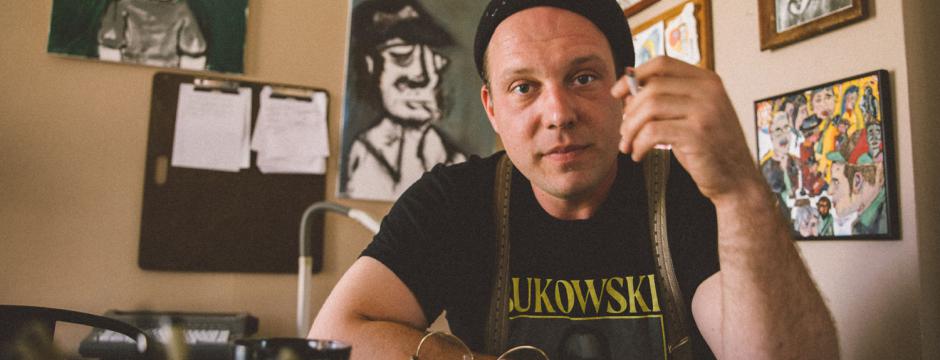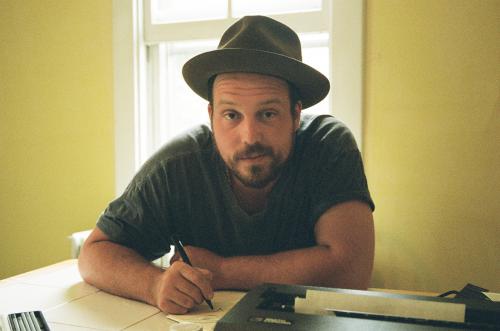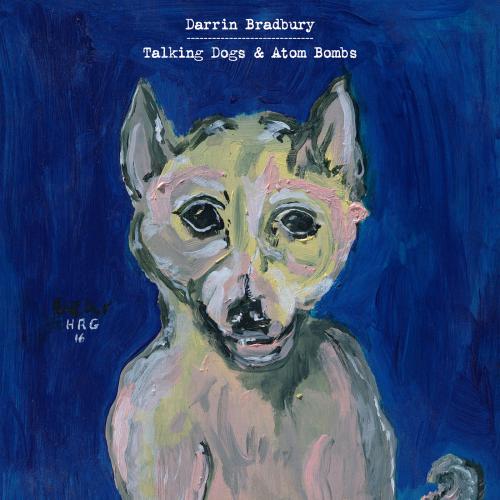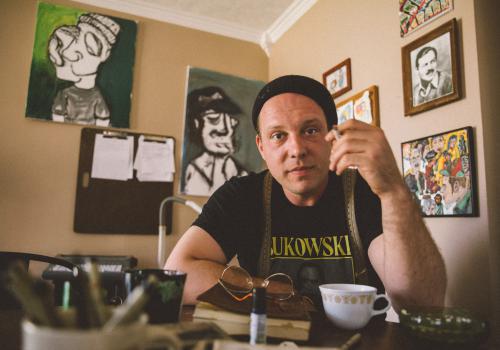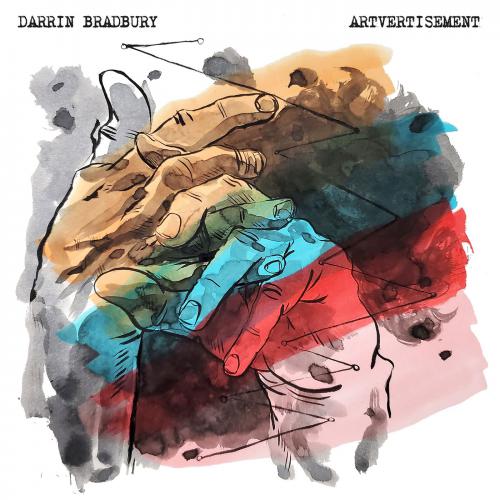Band: Darrin Bradbury
Album: Artvertisement
VÖ: 20.08.2021
Label/Vertrieb: ANTI- / Indigo
Website: https://darrinbradbury.com
"Why you gotta be so serious kid? / You are where you are and you live where you live."
This is the opening couplet of Darrin Bradbury's new album, Artvertisement, but it also encapsulates the ethos of much of Bradbury's work as a songwriter. Since releasing his debut album Elmwood Park: A Slightly Melodic Audiobookin 2016, Bradbury has documented the warts-and-all minutiae of everyday life with sharp wit and a big heart, doing so with a healthy dose of humor and a refreshing lack of self-seriousness.
Artvertisement is Bradbury's third album and second release for ANTI-, following his critically acclaimed 2019 LP Talking Dogs & Atom Bombs. Bradbury wrote Artvertisement while touring in support of Talking Dogs, and recorded the album at Trace Horse Studio in March of 2020 over the strange, anxious handful of days between Nashville's devastating March 3rd tornado and the start of the COVID-19 shutdown.
The title Artvertisement was inspired by Bradbury's difficult experiences navigating the polished, often soulless Nashville music industry, where record label executives would laud his songwriting —some going so far as to call him a genius —but ultimately turn him away because his music wasn't commercial."
This guy took me up into this office once, high up in this building," he says of one meeting. "He looked out of his window over the city and he turned to me after a long, introspective moment, looking upon the city he now owned, and he was like, 'So your whole thing is about being a big loser, right?'To cop to this, at the time I was pretty green, so I was like, ‘Uh, yeah, I guess so?'"
The title track, which recalls early Hold Steady with its raucous guitars and Bradbury's freewheeling, almost conversational delivery, distills this experience into one frantic, infectiously catchy minute, translating that particularly painful meeting into a blistering takedown of the commodification of art. "Artvertisement!" Bradbury sings, nearly yelling."We put your brand and their brand together."
That concept recurs across Artvertisement, which tackles the big questions —like why we're here, and how we can live principled lives in a capitalist hellscape —with vulnerability, heart and plenty of pop culture references. "Exile on Myrtle Beach," with its sing-along chorus and live show-ready arrangement, follows the imaginary exploits of some of Bradbury's favorite humorists, like Andy Kaufman and Richard Pryor. "Pizza and Drugs" is the LP's longest songand its most sonically traditional, with Bradbury day dreaming of reuniting with an ex-love over plaintive piano and a minimalist beat. And "Busted World" uses a folk-song scaffolding to build something of a doomsday pop song, with Bradbury declaring, "The whole thing is a joke and the joke's on you."
Sonically, Artvertisement draws more heavily from Bradbury's earliest influences —notably, early 2000s Saddle Creek artists, DIY punk and the Hold Steady's Craig Finn —than did his earlier work. You can hear those influences all over the album, like on the power-pop ode to Bradbury's sister, "Deanna, Deanna," and the gritty folk of "XXYTOPLEFT," which found lyrical inspiration in Alabama artist Rayvon Pettis.
To bring those sounds to life, Bradbury tapped close friends and bandmates Chase Ballenger, Preston Cochran, Ryan Sobband Scottie Prudhoe to join him in the studio. Kari Pennise, Irakli Gabriel and Cameron Carrus also contributed to the LP, while Cochran, Prudhoe and Sobb co-produced Artvertisement alongside Bradbury."
I wanted people that were like, 'Holy shit, I have the chance to play on a record that is going to be out there,' and understand what the weight of that means," Bradbury says. "I love studio musicians, but what interests me is, does someone play with a sense of urgency? And they interested me."
While Artvertisement was written and recorded months beforehand, Bradbury's June 2020 diagnosis of obsessive-compulsive disorder and PTSD has reshaped his conception of the album. After receiving his diagnosis from Vanderbilt, Bradbury spent two months in residential treatment in Oconomowoc, Wisconsin, where he underwent rigorous, often emotionally painful therapy to, as he puts it, "work to become a functioning human."
"The thing that a lot of people don't understand is that there is a complete misrepresentation of OCD," he says. "The suicide rate of people with severe OCD is twice the national average, because you just live with it. It never goes away."
Upon finishing treatment, he headed straight to Mahwah, New Jersey to spendprecioustime with his grandfather, Joe, who passed away from skin cancerin October 2020."He's the only person I felt like understood me," he says of his grandfather. "We have the same brain. We have the same mental conditions. He would always tell the hospice nurses, 'That's my grandson. He's the famous one. He has a record contract!' Knowing that he died thinking I was successful, that's all I ever care to get out of fame."
Bradbury then returned to his home in Nashville's Madison neighborhood, where he works on bikes and mopeds in his front yard and has close friendships with many of his neighbors. His house is strewn with paintings and sketches, instruments andrecords,andis also home to Bradbury's beloved pets: two dogs, Enzo and Albert, and two cats, Bobby Kennedyand Kikakeep him company.
While music is still his primary focus, Bradbury has leaned into working on visual art, which, like his music, draws out both the darkness and the humor of the everyday. He was first encouraged to draw and paint while inresidential treatment, and found that doing so is one of the few things that quiets his mind.
"I was having a really severe panic attack and they were like ‘You have to break away from being hyper-focused,and just do anything,'" he explains, holding asketch pad with green ink scribbled across the page."So I just scratched on this piece of paper, and it looked like a brain. Then I was like, ‘Well, fuck it, if I’m going to be doing this and I’m going to be seeking treatment, I might as well teach myself something new.’"
His art aligns aesthetically with his music. Hisportraits are abstract, stretching and warping facial features in service of communicating emotion, while his smaller sketches veer more toward humorand commentary. He sells his art on a"pay what you want" model, explaining that he is as happy to sell a painting for a nickel as he is for five hundred dollars. It may not be the kind of financial model that lands him a high-rise office overlooking downtown Nashville, but that's always been the antithesis of what Bradbury is about."Do no harm but take what you need," he says. "Holding on to success, holding onto money... What does it matter? We’re all going to die someday."
Band: Darrin Bradbury
Album: Talking Dogs & Atom Bombs
VÖ: 20.09.2019
Label/Vertrieb: ANTI- / Indigo
Website: https://darrinbradbury.com
Darrin Bradbury writes about the way things really are in America – a singular perspective shaped by a natural gift for storytelling, a lingering battle with depression, and a sly sense of humor. A self-described folk satirist who has toured the country for more than a decade, Bradbury collects his oddball observations in Talking Dogs & Atom Bombs, his first album for ANTI- Records.
“To be able to see the humor in the hard things in life has always been my goal,” he says. “I think the point of the songs is to make you feel better. Hopefully it’s the kind of record that if things are going really wrong in your life, it would be there for you in a way that you’re like, ‘Man, I’m glad this thing exists because it gets me.’”
Bradbury recorded Talking Dogs & Atom Bombs in just two days in Nashville with producer Kenneth Pattengale of the Milk Carton Kids and backed by musicians Jeremy Ivey, Alex Munoz, and Dillon Napier. Margo Price, a close friend and one of Bradbury’s biggest champions, sings harmony on “The Trouble With Time,” which captures the sadness, beauty, and wit found throughout the album.
“When I write, there are things that I want to get away with,” Bradbury says. “I want to get away with the line, ‘I woke up this morning and I got out of bed / Tripped on my pants and fell on my head.’ If I can get you to take that seriously, and not skip a beat when you listen to it, that's what I want.”
Bradbury grew up in New Jersey with an early interest in performing, partly because of his mother’s career as a circus clown. At the age of 7, he felt certain that he would either become a songwriter or a cartoonist. (He is quick to cite Billy Joel and Calvin & Hobbes as early influences.) He says he learned to play guitar as a vessel to tell his stories -- and because his handwriting and grammar steered him away from being a novelist. By the age of 18, he’d discovered Bob Dylan, Jack Kerouac, and Paul Simon, and decided to hit the road. Within a year, he’d seen 38 states.
At 25, he moved from Charlottesville, Virginia, to Nashville, to try making it as a songwriter. For three months in the dead of winter, he slept in his Ford Focus in a Walmart parking lot, with his bass player in the passenger seat. At every opportunity they’d play open mic nights, sometimes five or six nights a week. Eventually Bradbury moved into a sketchy duplex, and then into a friend’s Airstream trailer. By the time he played his first show at the 5 Spot – perhaps the nexus of East Nashville’s music scene – he’d developed enough of a following around town that he drew a sizable crowd.
With a handful of self-funded EPs and albums, Bradbury steadily cultivated a national audience by touring constantly. After being introduced to Pattengale at a Nashville gig, the two musicians stayed in touch. That led to a mentoring friendship, an invitation to open shows for the Milk Carton Kids, and Pattengale’s offer to produce Talking Dogs & Atom Bombs.
Speaking about the title track, Bradbury says, “I think the takeaway from that song is that nobody really knows anything. I don’t know when it will stop raining. It’s a song about being let down by life. All of our dreams are silly and nobody knows what’s going to happen.”
Indeed, a dark humor is woven through many of the songs on Talking Dogs & Atom Bombs. “It’s an album trying to combat depression, to laugh your way out of depression, and to be honest and accurate with that depression,” Bradbury believes. However, the album is also surprisingly upbeat due to his wry sense of humor. For example, “Breakfast” begins with a real-life observation of seeing two squirrels seemingly involved in a romantic relationship, when suddenly a hawk swoops down and carries one away. And that’s just within the first minute.
“I try to write things that make me chuckle, and that chuckling is usually making peace with the existential dilemma of both the times and life in general,” Bradbury says. “A lot of times, it’s like a challenge. It’s like, ‘All right, I’m starting this song off about squirrels, comparing them to Romeo and Juliet. Can I bring this sucker home? Can I make that idea work?’”
While performing, he’s seen the audience wondering the exact same thing – Is this guy going to pull this off? Bradbury compares the on-stage experience to standup comedy, where he carries the audience through to the relief point. Delivered in an almost conversational tone, “This Too Shall Pass” is laugh-out-loud funny, while “Nothing Much” (written by Jeremy Ivey) is well-suited to Bradbury’s own self-deprecating humor. “Motel Room, Motel Room” finds universality in an unexpected place (namely, the bed on the other side of the wall), and “So Many Ways to Die (Frozen Pizza)” is essentially a suicide manual with dinner thrown in. The album concludes with “Dallas 1963,” a short dream sequence that positions Bradbury as JFK’s assassin.
The payoff in Talking Dogs & Atom Bombs comes from listening closely to someone who’s been paying attention. “The American Life” is brutally honest in its assessment, down to politicized fried chicken and stadium-like churches. “Hell’s More or Less the Same” conveys Bradbury’s expert comic timing, while the very short “Strange Bird” is true to its title. In fact, all but two of the album’s 10 songs are under three minutes long -- and that’s by design.
“In the writing of this album, what was important to me was that the song was over when the thought was over. It wasn't about having to fill a certain amount of space,” Bradbury says. “If I'm not motivated to say anything more about this particular thing, I won't force it. I would rather have a minute-and-a-half song that I felt conveyed something unique.”
